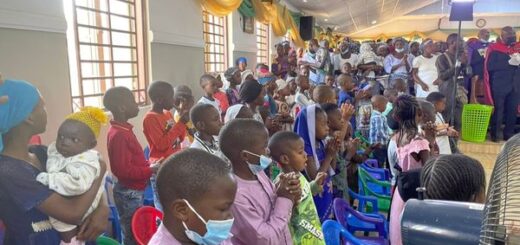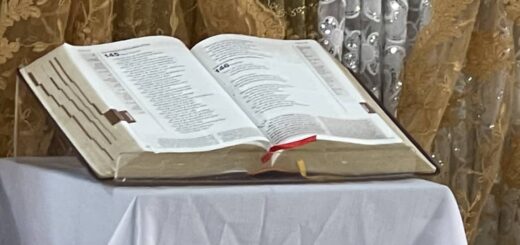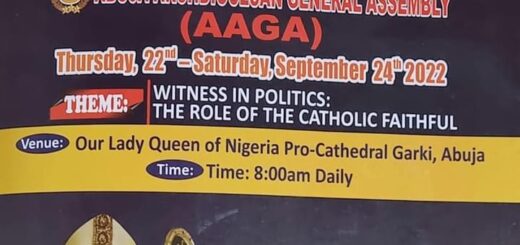“But who do you say that I am?”
by ARCH BISHOP · August 23, 2020
21st Sunday, August 23 2020, Homily by Archbishop I. A. Kaigama, at St. Mary’s Parish, Karu, Abuja
Readings: Isaiah 22:19-23; Romans 11:33-36; Matthew 16:13-20
Please, permit me to begin my homily by wishing success to our many children who are currently writing the West African Council Examinations (WAEC). Due to the lockdown on account of the COVID-19 pandemic, the students did not have the usual time to prepare for the exams in their normal school environment. We intensify our prayers that the Lord grants them knowledge and wisdom to pass very well.
In today’s gospel, Jesus asks two questions (not objective questions as in WAEC). The first question was about public opinion, “Who do people say that the Son of Man is?” (Mt. 16:13). The second was a question about the personal opinion of the disciples, “But who do you say that I am?” (Mt. 16:15). By this second question, Jesus wanted a personal answer coming from their knowledge and conviction about Him.
Having gone far in His public ministry and now facing the reality of his passion and death, Jesus realized that most of His disciples did not understand who He truly was or His mission. Many who followed Him were misinformed; they envisioned a political Messiah, a military warrior like David; one who was going to conquer the Romans and restore sovereignty to Israel. Some followed Jesus because they thought He was a healer (cf. Jn. 4:46ff; 5:1-5); a provider of bread (cf. Jn. 6:1-15); some thought he was a magician or a superman. Many were merely curious followers, while some followed because others followed, but some were true disciples.
Our opinions about who Jesus is should go beyond mere perceptions to a personal encounter with Him in the Eucharist, prayer, silence, nature and our neighbour. Peter, through God’s revelation recognized and publicly declared Jesus as the Christ, the Anointed One and Son of the living God, that suffering Servant identified in Isaiah 53; achieving victory through suffering, leading us to eternal life, not political liberation. He came to serve and not to be served.
For this confession of faith, Jesus made Peter the first leader of the Apostles, giving him authority which is symbolized by the image of the keys, with the promise that the Church would be built on a rock and the gates of the underworld shall not prevail against it (cf. Mt. 16:18). The authority given to Peter and the Apostles is what is given to the Popes and Bishops. We should therefore be able to trust the Successor of St. Peter and the successors of the Apostles, the Bishops, to point the way; to help us understand who Jesus is, through knowing the word of God and fidelity to the traditions of the Church.
The keys to Peter are a symbol of authority; as seen in the first reading where the keys taken from Shebna because of his pride and unfaithfulness are vested upon Eliakim, son of Hilkiah.
We Catholics believe that today, Pope Francis who is the successor of St. Peter, is the visible head of the Church and Vicar of Christ on earth and he can speak infallibly about faith and morals. The voice of our Pope on international issues has always been loud and clear, e.g. about secularism, relativism, the ecosystem, as in Laudato Si; marriage and the family as in Amoris Laetitia.
Every now and again the Holy Father calls for prayer and action for persecuted Christians and people dislodged from their homeland or suffering disasters such as in Syria, Lebanon, the Amazon region, and only last week, he showed great concern about southern Kaduna and other parts of Northern Nigeria for victims of violence and terrorist attacks. The Pope exercising the authority of Peter judges what agrees with the Gospel and what is contrary to it.
Let us pray for the Pope and listen to the truth that he teaches and be saved by it (cf. Jn. 8:32). The Catholic Church has survived for over 2,000 years because she is founded upon Christ and animated by the ever abiding presence of the Holy Spirit.
Beloved friends, it is possible to be with Jesus and not know Him; claiming to be His followers, listening to Him and reading about Him in the Scripture, but not truly knowing Him. We could be baptized and receiving Holy Communion, confirmed and even wedded in Church but still do not know Jesus. We may be consistent in attending Masses, enrolled into one or more pious associations in Church, paying our dues and levies and still do not know Jesus. Our knowledge of Jesus should spring from a personal discovery, gained through spending quality time with Jesus in prayer and meditating on the word of God.
Dear parishioners of St. Mary’s Karu, please, let us renew and profess our faith without fear or shame. Let us spend more quality time with Jesus and live for Jesus. I thank you and your Parish Priest, Rev. Fr. Uche Umeh MSP, for inviting me to pray with you. Do have a happy Sunday and a blessed week.




